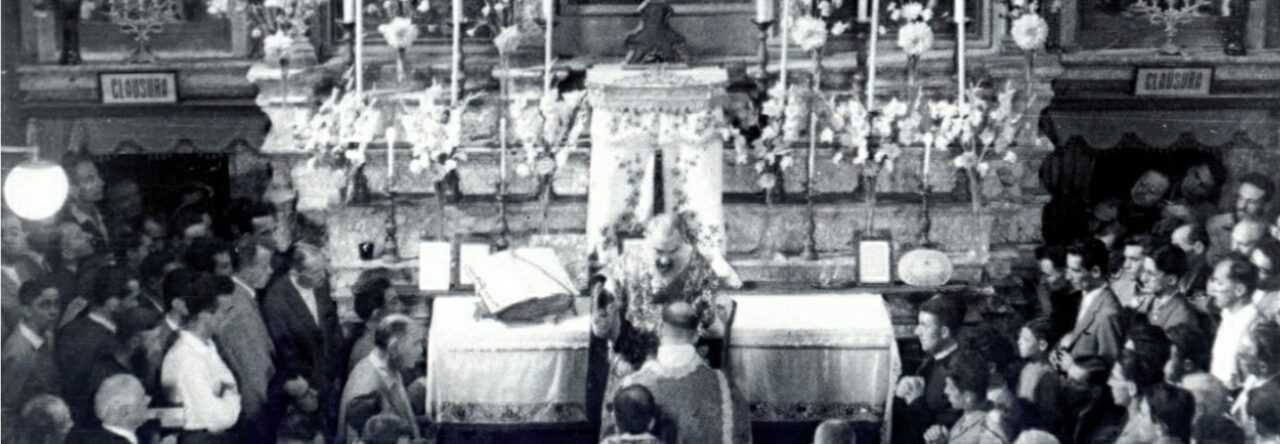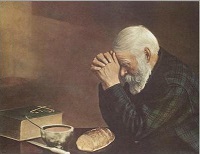A little while, and now you shall not see Me: and again a little while, and you shall see Me (Jn 16:16). According to St. Augustine, in this Gospel passage, Jesus speaks about the whole time from the resurrection to the end of the world, and he calls this “a little while.” In fact, Sacred Scripture speaks often in this way. That which seems like a long period of time for us is called short. St. Paul says “tempus breviatum est”, which means, the appointed time has grown very short (1 Cor 7:29), and St. John says that it is the last hour. And St. Paul says again in Romans: Besides this you know what hour it is, how it is full time now for you to wake from sleep; For salvation is nearer to us now than when we first believed; the night is far gone, the day is at hand (Rom 13:11-12).
Why this sense of urgency? People live to be seventy or eighty years old, or even older. So, this attitude might seem a bit exaggerated. Perhaps someone will respond to St. Paul, “the time doesn’t seem all that short to me; on the contrary, it seems long.” And we see that nearly 2000 years have passed since St. Paul and the others said such things. Therefore, this urgency not only seems exaggerated, but also wrong. In fact, we might say: “There’s no hurry; there’s plenty of time.”
On the other hand, we often say that we don’t have time for someone. We haven’t read that book, and we say so because we don’t have enough time. We haven’t responded to this letter or that email because we don’t have enough time. Or worse—and often enough—someone will say that he goes to Holy Mass when he can, but he doesn’t have time to go every Sunday, even if there are 168 hours in a week, and only one of these is necessary for Holy Mass. All of this is common enough, but it is rare that someone says that they have too much time. So, in this way, we realize that we don’t have much time…it seems that Jesus, St. Paul and St. John are right.
Let’s look at this again. How much time do we have in a week, in a year, in our lifetime? Even though sometimes we say that other people have more time than us, in reality, there are only seven days in the week, and this time is the same for all. Besides, each one of these days has twenty-four hours, and this interval of time is the same for all. There is only one way in which we can have more time or less time than another person and that is if we consider our lifetime, since each person either lives longer or shorter than another. But we do not know how long we’ll live, and, therefore, in each particular moment, we have the same time as everyone else does.
And this time which we all have: is it short or long? As we’ve said, St. Paul emphasizes the fact that our salvation is nearer to us (Rom 13:11). Each and every moment of the day “our salvation is nearer to us” inasmuch as we are closer to our death, when a person is ultimately saved or damned forever. We know that in the end we will be judged by our lives, by our love for God and our neighbor. Not even the little things will be excluded: Jesus says that we will be judged by every idle word (cf. Mt 12:36), and that whoever gives even a cup of cold water to his neighbor will not lose his reward (cf. Mt 10:42).
Now we begin to see why time is short: each moment of our life can have an infinite effect. With a single act of charity now, I will have more love, more grace, and more glory in heaven for the rest of eternity. And if I omit the act, then I will have less. But, it could be worse: if I have gravely sinned, I will be eternally lost, if I have not repented, and the time for this repentance is limited, even if I don’t know exactly how much time remains. Therefore, we can see the weight and the great importance of time!
Thus, we need to do all that we can with the time we have. Let’s try not to lose it! Every moment is extremely precious! As St. Benedict says in the Prologue to his Rule: Run whilst you have the light of life, that the darkness of death overtake you not (Jn 12:35)”. As St. Paul says, It is full time now to wake from sleep (Rm 13:11). Truly, then, the time is short.
(Homily taken from a Benedictine Monk in Norcia, Italy.)


Leave a Reply